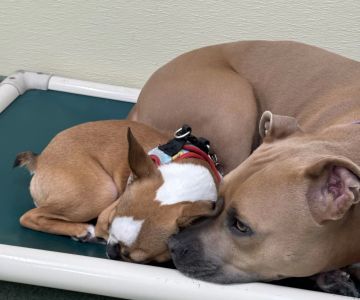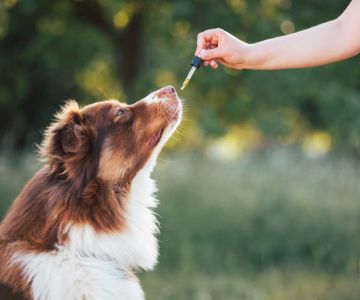Understanding Pet Anxiety
If you've ever noticed your pet acting nervous, fearful, or stressed out, you’ve likely witnessed signs of pet anxiety. Just like humans, pets can experience a wide range of emotional responses, and anxiety can affect dogs and cats alike. I first became aware of my dog, Max's anxiety when he started shaking and hiding during thunderstorms. It broke my heart to see him so scared, and I knew I needed to do something to help him feel more at ease. Over time, I learned that treating pet anxiety doesn’t always require medication, and there are plenty of natural solutions that can help calm their nerves and restore their sense of security.
Common Signs of Pet Anxiety
Before we dive into natural treatments, it’s important to recognize the signs of anxiety in pets. My cat, Whiskers, used to hide under the bed when guests came over, and Max would become extremely anxious when we left the house. Some common signs of pet anxiety include:
- Excessive barking or meowing
- Shaking or trembling
- Destructive behavior like chewing or scratching
- Hiding or withdrawing from people and other pets
- Panting or drooling excessively
- Loss of appetite or changes in eating habits
Recognizing these behaviors early is key to finding an effective solution and ensuring your pet’s emotional well-being. It’s also important to note that anxiety in pets can stem from a variety of sources, such as separation anxiety, fear of loud noises, or even changes in their environment.
How to Treat Pet Anxiety Naturally Without Medications
1. Create a Calm Environment
One of the simplest ways to help your pet manage anxiety is by creating a calm and safe environment. I remember the first time I started leaving a piece of clothing with Max’s scent on it when I went out, and I could tell it made a difference. Pets can often feel comforted by familiar smells and spaces. Set up a cozy, quiet area in your home where your pet can retreat to when they feel stressed. Consider using calming products like soft bedding or a favorite toy to encourage them to stay there when they need a break. This approach can provide a sense of security and reduce anxiety during stressful times.
2. Use Natural Calming Supplements
Natural calming supplements are a great way to help reduce anxiety in pets without relying on medications. There are various natural supplements available that promote relaxation and calmness in pets, including products containing ingredients like valerian root, chamomile, or lavender. I’ve used calming chews for Max that contained these natural ingredients, and I noticed that they helped him relax during stressful situations, like trips to the vet. It’s important to check with your veterinarian before giving your pet any supplements to ensure they are safe and appropriate for your pet’s specific needs.
3. Exercise and Mental Stimulation
Another natural remedy for anxiety in pets is providing them with regular exercise and mental stimulation. For my dog Max, going on daily walks or playing fetch in the backyard made a world of difference. Physical activity helps release pent-up energy, which can reduce anxiety and stress. Mental stimulation, such as puzzle toys or training sessions, also helps distract your pet from anxiety triggers. I found that keeping Max engaged in activities helped him focus on something positive and reduced his nervous behaviors.
4. Pheromone Diffusers and Sprays
For pets suffering from anxiety, pheromone diffusers or sprays can be a game changer. These products release synthetic versions of the calming pheromones that pets naturally produce when they feel secure. I’ve used a pheromone diffuser for Whiskers, my anxious cat, and it worked wonders to calm her down when she was stressed. Pheromone-based products are non-toxic and can be used in your home to create a soothing atmosphere for your pet. They’re particularly useful for pets with separation anxiety or those who are afraid of loud noises.
5. Gentle Massage and Touch
Massage and gentle touch can have a calming effect on anxious pets. My experience with Max has shown me that simply sitting with him and stroking his fur during stressful moments helps him feel more secure. You can also try massaging your pet’s muscles, especially along their neck, back, and shoulders. The rhythmic movement can help release tension and soothe your pet’s nervous system. Plus, this one-on-one time strengthens the bond between you and your pet, which in turn helps reduce their anxiety.
6. Calming Music or White Noise
Playing calming music or white noise can also help reduce pet anxiety. There are even specially designed playlists for pets that are designed to promote relaxation. For example, I used to play soft classical music for Whiskers when I left the house, and I noticed that it seemed to help calm her nerves. White noise machines or fans can also help drown out loud, startling noises like thunderstorms or fireworks, which are common anxiety triggers. The consistent sound can create a soothing background that makes your pet feel more secure.
7. Consistent Routine and Positive Reinforcement
Creating a consistent daily routine is one of the best ways to help reduce anxiety in pets. Anxiety often arises when pets feel uncertain about what will happen next, so establishing a predictable routine can provide them with a sense of stability. For instance, regular feeding times, walks, and play sessions help your pet feel secure in knowing what to expect. Additionally, I found that rewarding calm behavior with treats or praise works wonders for reinforcing positive habits. Over time, your pet will begin to associate calmness with good things, which can reduce anxiety.
When to Seek Professional Help
While these natural methods are often effective in managing pet anxiety, there are times when you may need to seek professional help. If your pet’s anxiety is severe or persistent, or if it’s causing harm to themselves or others, it’s essential to consult with a veterinarian or a professional animal behaviorist. They can help you identify the underlying causes of the anxiety and suggest further treatment options, including behavioral therapy or more specialized care.
Managing pet anxiety without medications is not only possible but can often lead to a more balanced and healthy pet. By incorporating natural remedies like pheromone diffusers, exercise, and supplements, you can help your pet live a more peaceful and stress-free life. Through patience and a little creativity, you’ll be able to reduce your pet’s anxiety and make them feel more secure in their environment.












